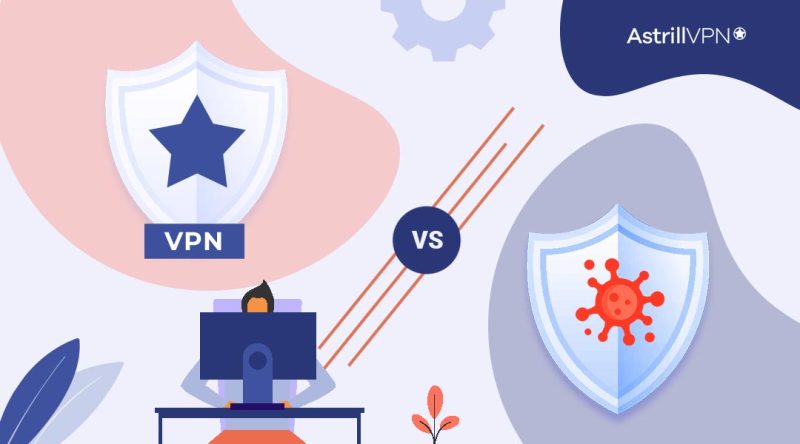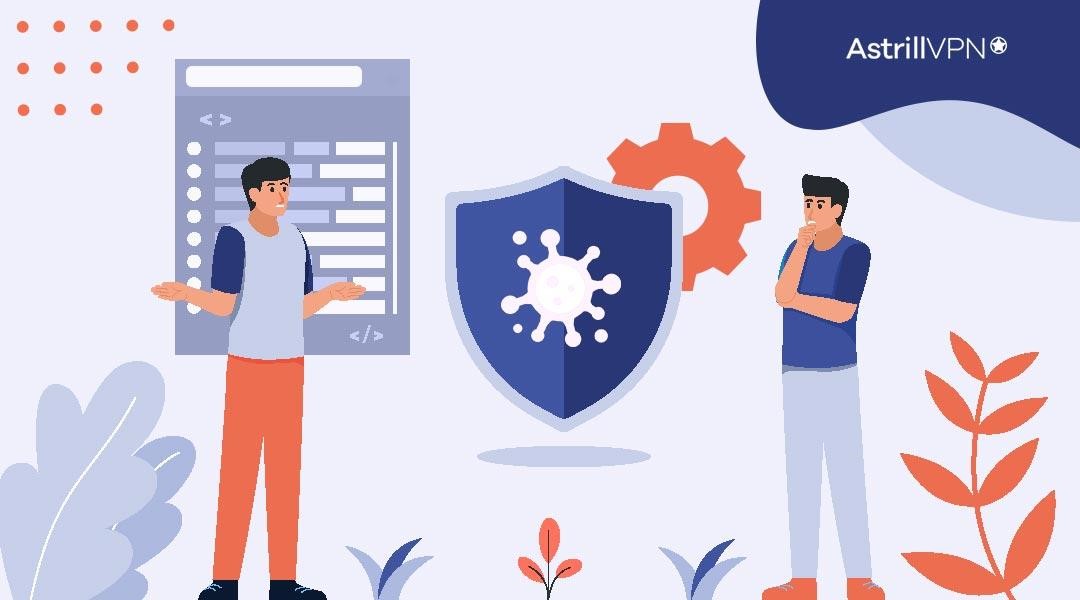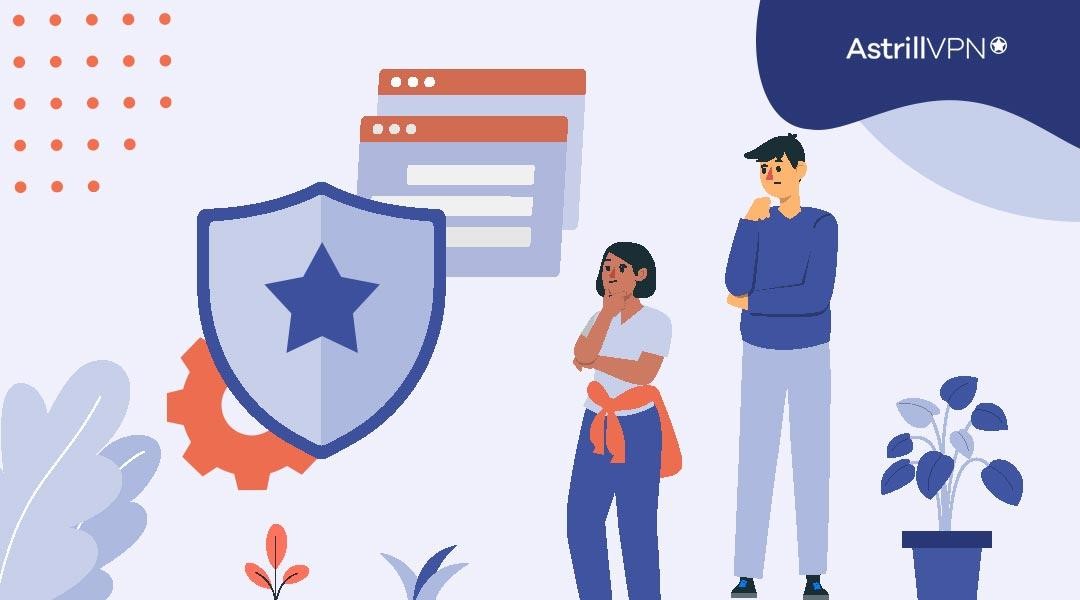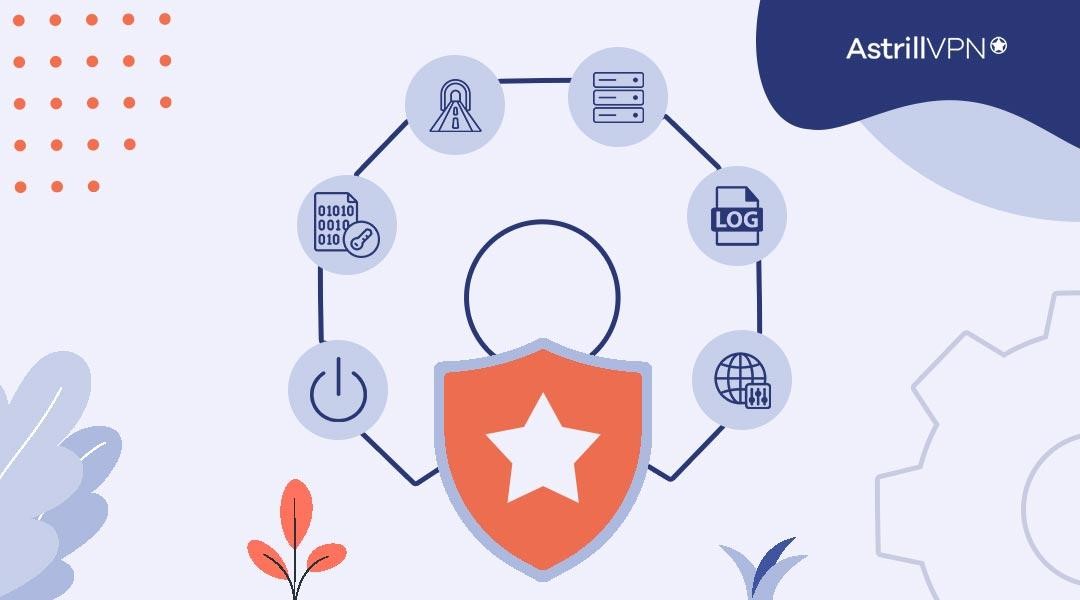VPN vs. Antivirus: Understanding the Differences

Urfa Sarmad

In the current digital landscape, the need for privacy and security is at an all-time high. Safeguarding our online presence has become a huge priority, with cybercriminals lurking about, just waiting for the perfect opportunity to compromise users’ confidential data.
Given the rise of these looming cyber threats, VPN and Antivirus have come to the rescue. So what sets them apart? What is the difference between vpn and antivirus? How can you use them to strengthen your online security? How can you make an informed decision about which one would better meet your security needs? Or can you use both simultaneously?
Buckle up your seatbelts; we’ll get into all these questions in-depth. So without any further ado, let’s get started!
Table of Contents
VPN vs. Antivirus – In A Nutshell
Since cyber threats have become more prevalent in recent years, antivirus and VPN software are essential security tools to curb potential threats, protect devices, and safeguard a user’s online privacy. So what differentiates the two? In a nutshell:
VPNs primarily focus on privacy protection:
A VPN creates an encrypted tunnel between your device and the internet. It masks your IP address, making it difficult for any third party to track your online activities. VPNs are commonly used to enhance privacy, bypass geolocation restrictions, and safeguard your confidential data while using public networks.
Antivirus protects your device from viruses and Malware attacks:
Antivirus software enables you to detect, prevent and remove malicious software, such as viruses, Malware, and spyware. It scans all your files, emails, and websites to identify potential threats, includes premium features such as firewall protection and real-time monitoring, and constantly updates your device to ensure all security measures are in place.
In short:
VPNs focus on privacy and Encryption, while antivirus software focuses on detecting and removing Malware. Both tools are essential in protecting and defending your online security, with the fastest VPN ensuring you remain anonymous and secure online. Antivirus software protects you against viruses and malicious software that can compromise your device and data. We’ll explore that in greater detail in the upcoming sections.
Surprising Facts About Cybersecurity
- In November 2022, Google blocked 231 billion spam, highlighting how much of an issue it’s becoming.
- According to Statista, 71% of organizations became victims of Ransomware Attacks in 2022.
- Statista also reported that the Global endpoint security market is projected to reach 13.4 billion US dollars in 2023.
- In 2022, the number of Malware Attacks reached 5.5 million, an increase of 2% compared to last year.
Given these interesting facts about cybercrimes and their continually rising, investing in a VPN and Antivirus software is a good idea to curb emerging cyber threats and ultimately get the best of both worlds.
Why Do You Need Antivirus Software?

There are many reasons why you’d need Antivirus on your device:
Protection Against Malware
Malware can include viruses, trojans, ransomware, spyware, or anything potentially threatening your online security. Antivirus detects and removes this malicious software from your device so that it doesn’t get compromised or its performance is affected.
Real-time Monitoring
Antivirus software updates your system in real-time, scanning all your files, downloads, and websites for potential threats. It also checks if any files on your device are corrupted. It identifies and stops any malicious activity before it harms your computer, proactively protecting your device against emerging threats.
Email & Web Protection
There are many antivirus software that offer email and web protection. It scans emails to ensure no malicious links and blocks websites that may host Malware or plan to implement phishing scams. By adding an extra layer of security, Antivirus prevents you from becoming a victim of malware attacks or phishing attempts and protects you from downloading harmful content.
Performance Optimization
Antivirus software protects your device from Malware attacks and helps improve its performance. It scans and removes unnecessary files and temporary issues and notifies you of any problems that may be slowing down your device or affecting its performance. Antivirus software enhances the user experience by improving performance and ensuring your device runs smoothly.
Regular Updates
Antivirus software has regular updates to ensure that it is up to date with its Malware database and frequent software updates. These updates ensure that your device is protected against any recent Malware threats. When you have these updates, you can have peace of mind knowing that your antivirus software can handle different kinds of emerging threats that may come up.
Premium Features of Antivirus Software
Although there is free antivirus software that can perform basic Malware scans and offer security, there are additional features provided by premium antivirus software that can benefit users:
Firewall
The firewall monitors and blocks any network traffic, whether incoming or outgoing. It serves as an extra layer of security to prevent and stop any potential cyberattacks, Malware, or unauthorized access.
Password Managers
It’s recommended not to have the same passwords for every account you own. Premium Antivirus software tools have Password management tools where you can securely save and automatically fill your passwords, leaving you with no hassle remembering them. You also have strong passwords for every account.
Secure Online Banking
Premium antivirus software offers secure browsing features that protect you when surfing the internet. It warns you of potentially dangerous websites on the internet and provides security when making online transactions and online banking. Premium software allows you to open a secure browser when completing online transactions.
Ad Blockers
A lot of ads seem genuine but are disguised as phishing scams. These fake ads will entice people to click on their links, but the user will ultimately fall prey to a phishing attack with all their data compromised. Premium Antivirus software blocks ads from insecure sites.
Ransomware Protection
Ransomware is malicious software that blocks access to your computer system and encrypts your files until the victim pays a ransom. Premium antivirus software has dedicated Ransomware protection that monitors your device for any suspicious activity and can help prevent ransomware attacks and recover your compromised files.
Why Do You Need A VPN?

A VPN creates an encrypted tunnel and masks your IP address, making it hard for anyone to track you or your whereabouts. If you want to surf the web safely and securely and keep your digital footprint hidden, then a VPN is the perfect place to start. Here are some crucial reasons why you’d need a VPN:
Privacy & Security
Using a VPN, your internet traffic gets routed and encrypted through a secure server. Encryption helps protect your identity and data from getting intercepted by hackers and third parties. It’s also helpful when using a public network, as they’re vulnerable to cyberattacks.
Anonymity
VPNs mask your IP address, making it difficult for hackers, advertisers, and websites to track or monitor your online activities and collect information about you. It also prevents anyone from figuring out your identity or approximate location and keeps your identity safe and secure.
Bypass Geolocation Restrictions
Many online services and streaming platforms, such as HBO Max, Hulu, and Netflix, have geo-restricted content. You can connect to a server in a different country with a VPN. It will appear as if you’re browsing from that specific location. It will enable you to easily bypass geolocation restrictions and access content unavailable in your region.
Enhanced Online Gaming & Streaming
VPNs enhance the online gaming experience by reducing latency and protecting against DDoS Attacks (Distributed Denial of Service). You can also access streaming services that are only limited to specific regions.
Save Money
Since VPNs can change your location, you can save a lot of money. Different countries charge different prices for the same services. People can save money, for example, by accessing cheaper flight tickets if they connect to a server in a country that offers more affordable pricing.
The Main Features of VPNs

VPNs have some essential features that take your privacy and security to the next level. Some of the major ones include:
Encryption
VPNs use Encryption protocols to keep your internet traffic secure. Your data is encoded so that no one can intercept or understand it. Encryption ensures that your online activities, browsing history, and data remain private. VPNs having AES-256 Encryption are secure.
Split Tunneling
A split tunneling feature enables you to route some of your internet traffic through an encrypted VPN tunnel while the other applications have direct access to the web. Split tunneling allows you to save bandwidth since some sensitive data can be protected through Encryption, and the rest of the applications can go through the local network to prevent any lags.
Server Locations
VPNs have servers located in many countries from all over the world. It enables you to choose from multiple server locations. A VPN with an extensive list of servers and locations is recommended. The more, the merrier.
No-Logs Policy
Ensure you use a VPN that doesn’t log your online activities or confidential information. A strict No-logs policy ensures that your personal information is safe and reduces the risk of your data getting exposed through unauthorized access.
Kill Switch
A Kill Switch feature automatically disconnects your device from the internet if your VPN connection drops unexpectedly. It is a crucial VPN feature that protects your data and privacy if a VPN connection drops for any reason.
DNS Leak Protection
A DNS leak occurs when some of your browsing data isn’t appropriately routed through the VPN, which could be visible to your Internet Service Provider (ISPs) or other third parties. Through DNS leak protection, the VPN ensures that your DNS queries are encrypted and routed through the VPN server, keeping your online activities and identity hidden from third parties and entities.
How AstrillVPN Can Help
Are you looking for a VPN provider packed with all these features? Then there’s no better place to start than with AstrillVPN. AstrillVPN offers 256-bit Encryption, Split Tunneling, an extensive range of servers, a strict No-Logs Policy, a Kill Switch feature, DNS Leak Protection, and excellent VPN Protocols such as OpenWeb, StealthVPN, and WireGuard to safeguard your privacy and help you bypass geolocation restrictions.
VPNs vs. Antivirus – The Key Differences
Since we’ve gone into the nitty-gritty of the different features and uses of VPNs and Antivirus software, we can now explore the key differences and what makes them different from one another:
| Feature | VPN | Antivirus Software |
| Data Privacy | VPNs mask your IP address and hide your location, enhancing online privacy. | Antivirus Software does not hide your IP address or location. |
| Data Encryption | VPNs encrypt all data, keeping it safe even on an insecure or public network. | Antivirus Software does not offer data encryption. |
| Threat Protection | VPNs protect against data interception but not against Malware, Viruses, or Ransomware. | Antivirus Software offers extensive protection against Malware attacks, viruses, Spyware, and Ransomware. |
| Geo-restrictions | VPNs can bypass geolocation restrictions and censorship by masking your IP address and connecting to a server in a different location. | Antivirus Software does not offer any functionality for bypassing geolocation restrictions or censorship. |
| Network Security | VPNs protect the entire network and all applications on the device. | Antivirus software does not provide security for the network connection but protects the device and its files and data from external threats. |
| Firewall | Firewalls aren’t found in all VPN providers and aren’t one of their essential functions. | Most Antivirus software has built-in firewalls to block unauthorized access to your device. |
| Safe Browsing | VPNs enable safe browsing by encrypting users’ data. It doesn’t block malicious websites. | Antivirus software blocks access to malicious websites, keeping your browsing experience safe and secure. |
Final Thoughts – Do You Need Both?
Users should use antivirus with VPN on their devices for optimum security. Given the constant cyber threats in the digital landscape, your best course of action is to use both. While VPNs and Antivirus serve different purposes, they complement each other by helping protect users against external threats.
If you want to get started, pair AstrillVPN with popular Antivirus software such as Norton Antivirus, McAfee, or Avast Antivirus. The Antivirus software you choose depends on your individual needs and preferences, but this will give you a headstart.
Frequently Asked Questions (FAQs)
You can adequately maintain digital security if you use both of them simultaneously. Both work together to protect you from external threats and safeguard your privacy online. You will need to use both to protect yourself fully from cyber threats.
Antivirus software protects your device against Malware, Viruses, and Ransomware. For comprehensive privacy benefits, you should invest in a VPN.
It would be best to have a VPN, even with Antivirus software. Although VPNs don’t protect against Malware and Viruses, it encrypts your data and masks your IP address, keeping your online identity hidden and anonymous.
Using both simultaneously should not cause any performance issues or conflicts. Running them both could cause a slight decrease in your device’s performance. However, devices are now well-equipped to handle the load of both running together.

No comments were posted yet